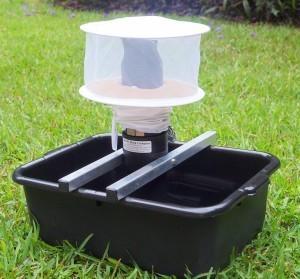
A mosquito trap like those used by Hays County. Hays County photo
Health alert issued for West Nile Virus disease
Health authorities were put on alert earlier this week when a case of West Nile Virus disease was confirmed in Austin. But so far, Hays County been lucky, the county’s epidemiologist says.
“To our department’s knowledge, we have never had a human diagnosed with West Nile that is/was a Hays County resident, Eric Schneider said.
“Our mosquito surveillance team did catch a mosquito that tested positive for West Nile back in 2016, but after a week of setting multiple traps in the same area, we did not catch another positive mosquito,” he added.
Along with the Austin case, the virus has also been confirmed in Dallas and Galveston, according to the Texas Department of State Health Services. Even though the area is in the middle of a dry spell, mosquitos, including those capable of spreading West Nile and other diseases, are still prevalent — capable of breeding in an amount of water equal to that a bottle cap can hold.
To protect themselves and their communities, people should take steps to avoid mosquito bites and reduce mosquito populations:
Regularly apply EPA-registered insect repellent while outdoors.
• Dump out all standing water inside and outside homes and businesses so mosquitoes can’t lay eggs.
• Use air conditioning or make sure window and door screens are in good repair to keep mosquitoes out.
• Cover up with long sleeves and long pants to help prevent bites.
Most people who get infected with West Nile virus don’t get sick. About 20 percent develop West Nile fever, a fever that can be accompanied by headache, muscle and joint aches, nausea, diarrhea and fatigue. People with this form of disease usually recover on their own, though symptoms may last for several weeks. Less than one percent of those infected will develop the more severe West Nile neuroinvasive disease, in which the virus infects the nervous system. Symptoms can include those of West Nile fever plus neck stiffness, muscle weakness, vision loss, tremors, convulsions, disorientation, coma and paralysis. Recovery can take months, and some effects on the nervous system may be permanent. About 1 in 10 people with West Nile neuroinvasive disease die.
People experiencing West Nile symptoms should contact their health care provider for possible testing. There is no vaccine to prevent West Nile and no specific treatment, though over-the-counter and other medications may help relieve some symptoms.
Additional information on West Nile surveillance and a link to current human case counts is available at TxWestNile.org.











